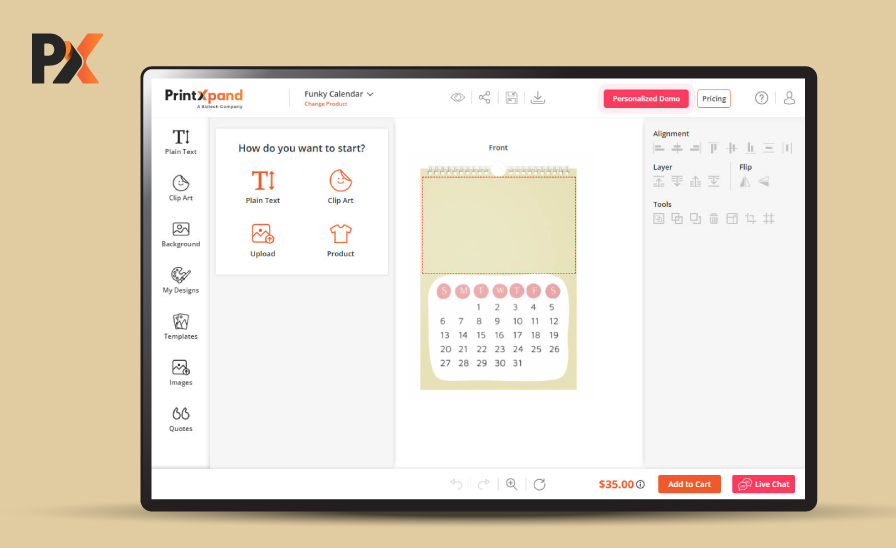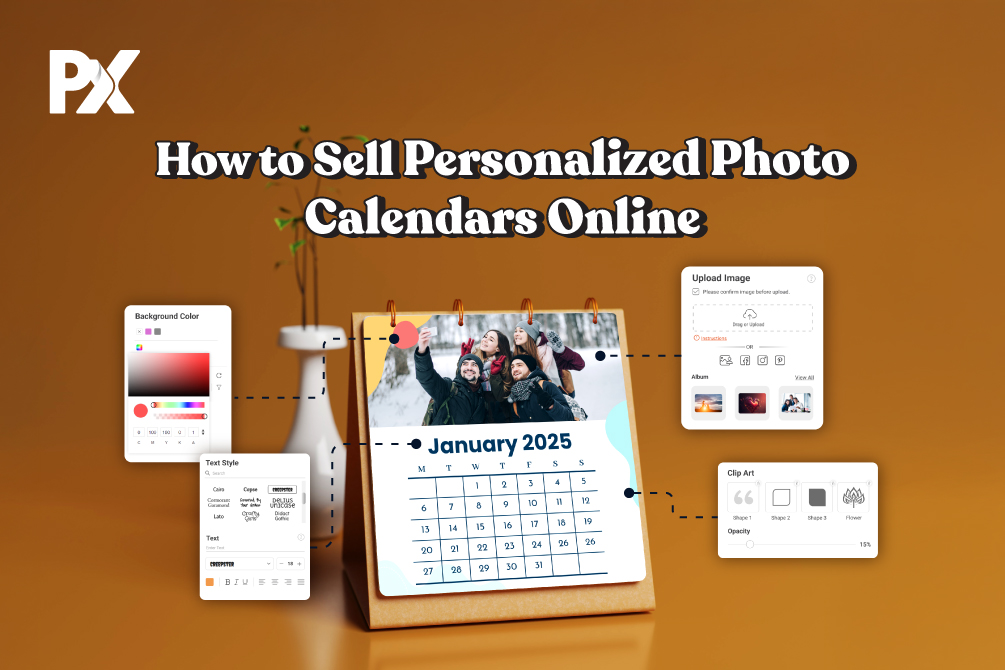Summary
A lot of people think that with the wake of the digital era, the physical calendar days are gone. But it is not completely true. Although many people use digital calendars and calendar apps, personalized calendars have their own audience. In fact, personalized calendars and planners have gained a lot of attention in recent years. From corporate to home decor calendars, they’re used everywhere. Personalized calendars also happen to be quite a good gift.
So, if you’re planning to get into the personalized calendar business, now is the right time to do so. If you already own a calendar business, it is the perfect time to look into the aspects of personalization and take your business online. Through personalization, you can allow your customers to turn photos into calendars that will remind them of the things they love every day. offer a plethora of designs and styles to choose from and delight your customers.
Hereon, we have curated a list of dos and don’ts for entrepreneurs planning to sell personalized calendars. This guide will give you a professional outlook of strategies and designs for your calendar. It also includes the answer to the question “How to sell calendars?” and some promotional tips. Make sure you follow these points before you start to sell calendars online. Give the most curated experience to your users!
Custom Calendar: Market Scenario
Most entrepreneurs limit themselves by thinking that physical calendars are antiquated and obsolete now more than ever. But they’d be surprised to find out that physical calendars are still common.
Calendars, being the most popular promotional product, are incredibly versatile. In today’s market, they come in various different styles and sizes. From standard calendars to pocket calendars to interactive, designer calendars, it is really easy to find something unique to make your brand blow the competition away.
Most people consider calendars a valuable gift. Many of the households enjoy receiving calendars as a complimentary gift. With the increasing demand for calendars, it is also the most appropriate time to take your calendar business online.
Benefits of Selling Calendar Online
The world has seen an increase in online selling of merchandise since the beginning of 2020. Think from your customer’s point of view. Who wouldn’t want to search through a number of designer products right from their couch? Plus, if you have a calendar design option in your store offering, you will surely get a massive digital footprint.
Another benefit of going online is that you do not need to have a huge store in a popular location. You do not need to direct your capital there. With the basic printing and designing equipment, you can start a calendar business right from your own home. Plus, it is easier to get word-of-mouth publicity online. Customers can easily share your offerings, buy them right then and there or even save the calendars for later purchase. All this is not possible in offline stores. Thinking about beginning your online calendar store right now? Why not invest in a tool that seamlessly integrates with the online store and helps you set up the business?
Give customers the option to design photo calendars. See how a Photo Calendar Design Tool can help you.
5 Things to Keep in Mind Before You Begin
Now that we are aware about the market trends and the benefits of an online business, let us quickly have a look at the dos and don’ts. Here are five simple steps to sell calendars online and start your online business easily and quickly.
1. Know Your Audience
The first and foremost thing to do is to understand your audience. The niche, budget, marketing strategies, and so on will depend on the audience you choose to target. Define your audience simply by categorizing them based on various aspects such as age, generation, location, and so on. If you want to involve everyone and make a brand that serves every category then so be it.
You can categorize your products into various unique niches as a part of your larger brand strategy. It is best to start with the target-all audience approach as it ensures that you have a product for everyone who visits your e-store. Besides, it is not very difficult to offer various designs that attract all audiences.
2. Theme and Unique Concept
The next step is to think about the strategies that would mark your identity in the market. Your products must be unique in their offering, be it a shiny summer theme, fashion theme, or existential quote theme. You’ll need designs that are unique and generally unavailable in the market.
When you start with the designs, at first you may feel that it is just a collection of images. Later on, you can categorize these collections into various themes and subcategories. You may also come up with multiple designs by mix-matching these categories and unifying themes. Once you specialize in a certain type of design you can have a trademark for your designs too.

You can include themes like an informal holiday-theme, a formal work/motivation theme, seasonal aesthetics, a professional photographic theme, a comic theme for children, artistic themes, and many more. It is very important to choose a theme that matches up to your customers’ preferences. You can research trending themes keeping different audience sets in mind.
Another way to stand out in the marketplace is offering print-on-demand customization. Print-on-demand simply means that you let your customers design their products. Not many calendar businesses offer product customization. And so, you can easily get ahead in the race by offering product customization.
3. Print-on-demand: For the Win
Currently, personalized calendars are trending the most in the digital environment. People prefer customizing their calendars as per their taste instead of buying the same ones that every other person buys. It makes more sense to them if they could create photo calendars that remind them of their memories.
Personalization generally leads to higher profits because the customer gets exactly what they want. It brings customer satisfaction and builds loyalty. The more flexible the designing tool, the higher the profit. Hence this could be a unique offering for your custom photo calendars business. But it requires the necessary technologies and infrastructure to implement this idea in your online photo calendar business.
You will need to work with experts who know everything about the product designing industry. Look for experts who can help you frame the perfect, cost-effective, and lucrative business model our Photo Calendar Design Tool.
Explore all the features of the tool by clicking the link below.
4. Choose the Right Design Software
Choosing the right photo calendar designer tool is the key to win the online marketplace. Before you begin selling calendars online, it is important to choose a design software that stands out from the crowd and provides customers something that they would actually love.
Investing in a photo calendar designer tool will let your customers design calendars using their choice of designs, colors, and get them printed the way they want to.
Here are some quick tips to pick the right photo calendar design tool:
- It must have a user-friendly interface to let customers design easily and quickly.
- The tool must have some basic as well as new features to compete in the dynamic industry.
- It should be cost-effective and lucrative for your business model.
- It should follow the latest industry standards and should be secure for your e-store.

Talking about the features, here is a list of the top 5 essential features that your calendar design software should have:
- Ready-to-Use Templates: Allow your customers to pick and use any template that they like. You can also design your own templates that customers can further customize.
- Clipart Library: Let your customer explore multiple editable clipart and use them to design their photo calendar. You can also create custom new clipart, catering to different needs.
- Bleed, Cut, and Safe Lines: The line guidelines help to avoid printing errors. It guides and shows clear warning messages alerting customers to keep any text or image within the printable areas.
- In-built Photo Editor: Enable customers to get creative with the powerful photo editor that comes pre-built with the calendar design tool. They can add effects and filters, adjust brightness, and much more to make every photo perfect.
- Huge Font Library: The tool integrates a wide variety of fonts, available in the library. Customers can easily use the font styles of their choice and make their personalized calendars even more special.
Here are the factors that you should consider before picking any designer software:
- Diversity in structure
Choose software that lets you offer diversity in its structure. Your designer tool should let you and your customer design calendars in the shape and size they prefer. You can even include some options to let customers adjust their journaling area with features like alignment, space, etc. The calendar structures will depend on various types of calendars. Some of the major calendar types are:
- Desktop calendars
- Poster calendars
- Wall calendars
- Magnet calendars
- Mouse pad calendars
- Print Material
Select software that lets you print on various materials. It is important that you offer them a number of types of paper. Presently in the market, there are two types of papers majorly used for the calendars: glossy and matte. While glossy papers are great for the overall finish of the pictures, matte paper provides a sharp printing output.
- Flexible Customization
Last but not least, choose a tool that lets you provide flexible customization. Let the customers mark their important events, public holidays, or any date that they would want to remember. Hence, you must select software that lets you provide options like color, clipart,and symbols to help them highlight that part accordingly.
For example, the PrintXpand’s Photo Calendar Design tool comes with two sections. From the left panel, customers can apply the primary level of customization. For detailed changes like adjusting layers, applying photo effects, and other custom settings, they can utilize the right panel.
Learn more about what this tool can do to make calendar personalization a breeze for your customers.
5. Online Presence
Before you begin to sell calendars online, here’s the last step to take care of i.e., building your online presence! This is a huge step for you to tell your customers about your unique offerings. What good is a business if its customers do not know about them? Hence building and maintaining your online visibility is of importance.
You will need a website or an ecommerce store to showcase your products. A social media account dedicated to your custom photo calendar can greatly boost your online presence. If you are just beginning your business, then a social media account with its free promotional tools can help you increase your reach. Let us have a quick look at your options:
- Build your Website
You will need to register a domain name and build a website. You can create your own website and customize it to make a benchmark for your brand. You can either build an ecommerce website directly or build a separate website and then integrate your ecommerce store into it.
- Select Appropriate eCommerce Platform
Selecting the right e-commerce platform is a crucial step. There’s a pool of options to choose from. This is crucial since you’re focusing on a specific use case—building it specifically for your calendar business. You can categorize your selection on the basis of licensing, cost of development, customization, support services, and so on.
Magento, Shopify, and WooCommerce are three popular ecommerce platforms with active communities for developers to support. To know more about these platforms, visit this detailed guide.
- Build your Social Media Pages
Build a social media page to publish your content and improve your reach. With most millennials and younger generations active on social media these days and with your unique product offering, your calendar business is surely going to get good business.
PrintXpand: One-Stop Solution to All Your Problems
We hope this guide helps you create a clear plan to sell calendars online. However, the main decision to make is the choice of the ecommerce platform and a product design tool.
PrintXpand provides reliable web-to-print solutions compatible with multiple platforms. The tool also offers custom integrations like Print Inventory Management and Print Job Manager to simplify operations.
Ready to kickstart your business? Explore the features of PrintXpand Online Calendar Design Software and get started with setting up the operations.
All product and company names are trademarks™, registered® or copyright© trademarks of their respective holders. Use of them does not imply any affiliation with or endorsement by them.


![How to Build a C2C Marketplace [A Complete Guide] blog img](https://www.printxpand.com/wp-content/uploads/2021/09/How-to-Build-a-C2C-Marketplace_.jpg)

